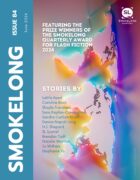You’ve published numerous pieces about your character Sarah. What about her character has made her particularly compelling to you as the focus for this series?
Oops! Confession: Early on nothing about her—as a character—seemed all that interesting to me. I didn’t write these because of her character but because of her voice. I had no idea who she was as a character, but I had a sense of how these things would sound. Mostly, it came out of a wrestling match with form; I’d been “trained” as a poet and was used to working in the line, but I love and understand the sentence—as a unit of meaning—much more than the line. So, the early Sarah stories, which I was then calling prose poems, allowed me to do some linguistic gymnastics with sentences that I hadn’t felt the freedom to do before. That came out of the voice, which I guess is not exactly her voice, but is critical to my understanding of her and her character. So, in this regard, voice preceded character and still probably does.
Details throughout your writing allude to a modern setting. Are there any present social concerns or attributes of twenty-first-century living you aimed to reflect on through Sarah by placing her in the present?
There’s zero intent for that, but as I often tell students, intent doesn’t always have a lot to do with it. I hope to never address an issue like social media directly in these stories, but “Sarah draws little moustaches” probably gets at a very modern, social concern—but in an analog way. She’s giving a reading, and flyers go up around campus promoting it. And what does she do? She starts defacing them. Herself. As writers, we kind of have to engage in that online, social media-based shameless self-promotion, and I cringe almost every time I post one myself. But it’s something that has to be done. For you and your “career,” and also to honor the folks who are publishing a piece or giving you a platform to read or talk. I think that cringe element comes out in her attitude toward the flyers, which are hard copy but reflect a very twenty-first-century, digital component of our identity. But none of that was intended. The story started out by asking, “What ornery thing will Sarah get up to today?”
Sarah’s attachment to writing and academia is central to your depiction of her life. How does your own experience as a writer and educator shape Sarah? Do you find your personal experience is often reflected in your fiction?
That’s actually something I think about a lot: the freedom this mask has afforded me. Sarah is a woman, she’s single, she has no kids. That’s about as far away from my experience as you can get. But I think these Sarah stories reflect my personal experience more deeply than any other thing I’ve written, even ones that indulge in the first-person pronoun. I suspect that’s because of the difference, the mask, and not despite it. But the similarities aren’t the simple, categorical ones: gender, marital status. Instead, it’s these little moments that might not be noticeable to anyone but me and the few people who know me best. And it’s a little startling to see those reflected when you return to a story in revision: Oh, that’s me, but in a weird, unexpected way.
As for being an educator, that’s a huge part of our shared experience. In fact, there are piles of stories arranged by theme on a table just a few feet from me. One category is “Academia/The Dean.” One is “Teaching.” I teach writing, I coach soccer, and I am a parent. Sarah and I both probably see that we are frequently seen by others, even though we’d really like to slip away and be unseen and petty and frivolous and just draw moustaches—or worse—on a poster somewhere.
Familial relationships play a significant role in Sarah’s life. Is there a reason you chose to primarily focus on Sarah’s relationships with her family, rather than other kinds of relationships?
One reason might have to do with the mask, again: I do not have a contentious relationship with my mother or my sister, though Sarah does. So, exploring those doesn’t put in jeopardy any “real” relationships I have in my life. But there are real bits that I’ve observed here and there that make it into the stories. And I’d be lying if I said nothing from my own relationships with my family were manifest there.
As for other relationships, that has actually been a little more conscious. My dad was a small-market radio personality, so I was often known as Terry Todt’s boy. My wife is a physician, which comes with some status—especially compared to a creative writer—so I’m Dr. Todt’s husband. I stayed home with our boys, so I was known as Jacob and Zachary’s dad. It probably hasn’t been until the last few years that I felt I carved out an identity of my own. Maybe that’s why Sarah remains unattached, because being a partner and parent can subsume your identity, and I’m too curious about her at this point to let that happen.
You have published short prose both as fiction and poetry. How does your process when writing flash fiction versus prose poetry compare?
Oh, there’s no difference whatsoever! In an interview, Mary Ruefle talked about sending a story out and getting a rejection from the editor: “Dear Miss Ruefle, we are terribly sorry, but we don’t publish poetry.” I think a similar thing happened here. I started submitting these as prose poems, and they all got rejected. Then I tried them as fiction, and they’ve found homes. Everything starts with language, typically a first sentence or a first clause, and it’s only afterwards I figure out if it’s a prose poem, a nonfiction essay, or a story.



 The core workshop of SmokeLong Fitness is all in writing, so you can take part from anywhere at anytime. We are excited about creating a supportive, consistent and structured environment for flash writers to work on their craft in a community. We are thrilled and proud to say that our workshop participants have won, placed, or been listed in every major flash competition. Community works.
The core workshop of SmokeLong Fitness is all in writing, so you can take part from anywhere at anytime. We are excited about creating a supportive, consistent and structured environment for flash writers to work on their craft in a community. We are thrilled and proud to say that our workshop participants have won, placed, or been listed in every major flash competition. Community works.